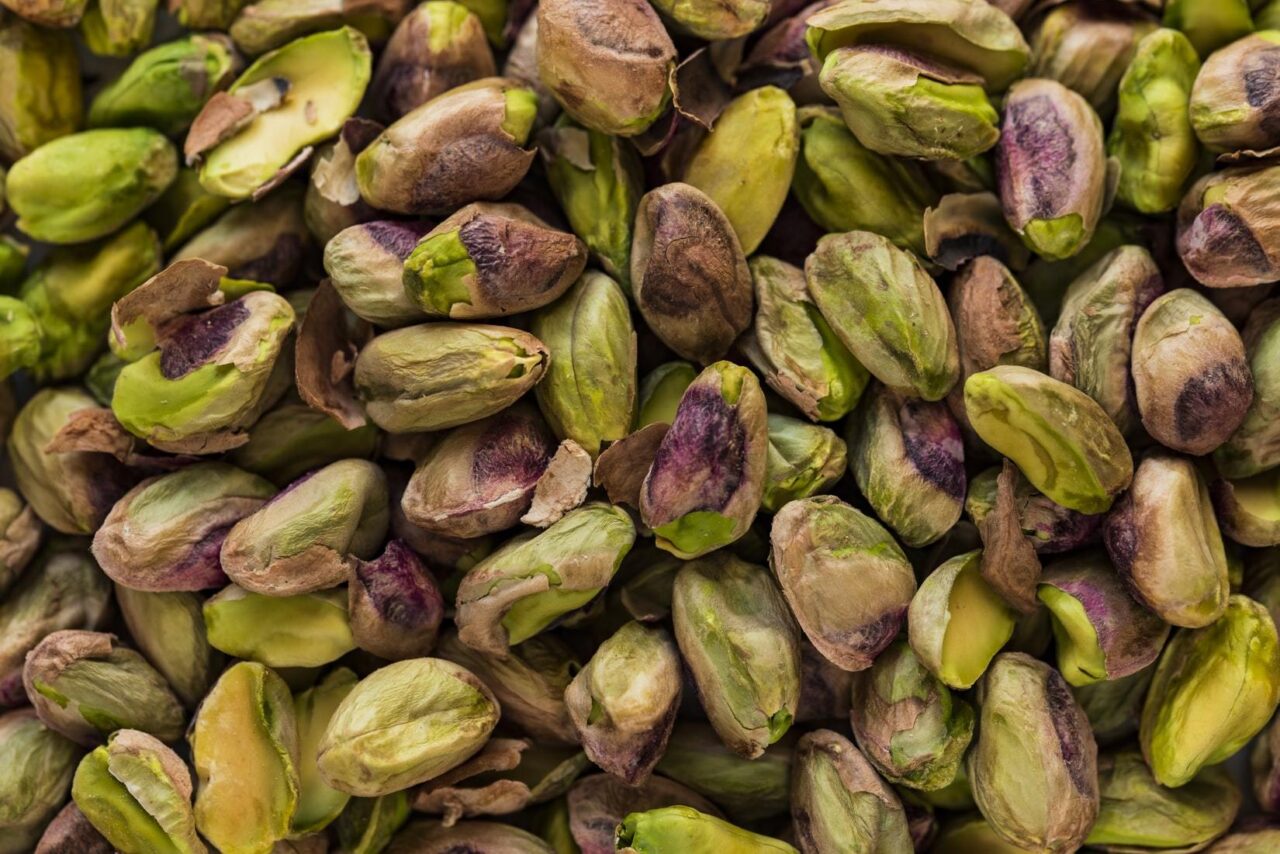
Can Dogs Have Pistachios? Know the Risks
Information Provided By: Tiffany Ruiz Dasilva, VMD, cVMA | Professional Services Veterinarian, Wild Earth
Key Takeaways
-
Dogs should not eat pistachios due to their high fat, salt content, and risk of mold contamination, which can cause serious health issues.
-
Pancreatitis is a major risk from pistachios, leading to vomiting, diarrhea, abdominal pain, and lethargy.
-
Salted pistachios can cause sodium ion poisoning, which may result in excessive thirst, tremors, and even kidney failure.
-
Pistachio shells pose a choking hazard and can cause dangerous intestinal blockages that may require surgery.
-
If your dog eats pistachios, monitor for symptoms, and if they consume large amounts, salted nuts, or moldy pistachios, seek immediate veterinary care.
-
Safer alternatives include dog-friendly treats like carrots, apples, blueberries, or Wild Earth’s plant-based dog treats, which are designed for optimal canine nutrition.
No, your dog should not eat pistachios as they are unsafe. While pistachios are not toxic for dogs, the high fat and salt content can make them dangerous. For this reason, it is typically not recommended to give them to your dog, and to instead give them a healthy dog treat.
According to the ASPCA, the high-fat content in nuts like pistachios, pecans, and macadamia nuts can cause vomiting and diarrhea in dogs.
Why Dogs Should Avoid Pistachios
Dognutrition.com writes that foods high in fat like pistachios and hazelnuts are known to cause pancreatitis (inflammation of the pancreas) in dogs.
Safer nuts for dogs to eat, according to PetMD, include peanuts, almonds, and cashews. If you feed your dog any of these kinds of nuts, however, they should be unsalted and unseasoned. If your dog ingests too much sodium from salted nuts, they could develop a dangerous case of sodium ion poisoning. Too much salt is dangerous and can lead to vomiting, diarrhea, lethargy, tremors, and excessive thirst, according to WedMD. Ingesting too much salt also affects water retention in dogs, which increases the likelihood of kidney failure.
Why Are Pistachios Dangerous for Dogs?
Pistachios are not safe for dogs because they contain high fat, salt, and sometimes harmful mold. These factors can cause health issues ranging from mild stomach upset to serious conditions like pancreatitis or liver damage.
High-Fat Content
Pistachios contain high amounts of fat, which can be difficult for dogs to digest. Consuming too much fat can lead to pancreatitis, a painful and serious condition that causes inflammation of the pancreas.
Symptoms of pancreatitis in dogs include:
-
Vomiting
-
Diarrhea
-
Abdominal pain
-
Lethargy
-
Loss of appetite
Pancreatitis can be life-threatening if left untreated, so it’s best to avoid high-fat foods like pistachios altogether.
High Salt Content
Salted pistachios can cause sodium ion poisoning in dogs, which occurs when a dog consumes too much salt. Excess sodium can disrupt their body's fluid balance and lead to dehydration, kidney issues, and even seizures.
Symptoms of salt toxicity include:
-
Excessive thirst
-
Vomiting
-
Diarrhea
-
Tremors
-
Weakness
-
Potential kidney failure
Even a small handful of salted pistachios can be harmful, so it's important to keep them out of your dog’s reach.
Choking and Intestinal Obstruction
Pistachio shells are especially dangerous for dogs. If swallowed, they can cause choking or blockages in the digestive tract, leading to severe discomfort or an emergency situation.
Intestinal blockages can be life-threatening and often require surgical removal. If your dog has eaten pistachio shells, monitor for symptoms like vomiting, difficulty defecating, or abdominal pain and contact your vet immediately.
Aflatoxin Risk from Mold
Some pistachios, especially those that are old or low quality, may be contaminated with aflatoxins. Aflatoxins are toxins produced by the mold Aspergillus, which grows on certain nuts, including pistachios.
Aflatoxin poisoning can cause:
-
Jaundice (yellowing of the eyes or skin)
-
Lethargy
-
Vomiting
-
Orange-colored urine
-
Loss of appetite
Because aflatoxins can cause liver damage, dogs who ingest mold-contaminated pistachios should see a veterinarian immediately.

What Is Pistachio Poisoning?
It is possible for dangerous mold, namely Aspergillus, to grow on low-quality pistachios or pistachios which aren’t contained and sealed properly. This mold can then produce aflatoxin, which is toxic to dogs, affecting the liver. Ingestion of affected pistachios is often referred to as “pistachio poisoning”.
Symptoms of Pistachio Poisoning In Dogs
The following are symptoms of pistachio poisoning in dogs from Aspergillus mold:
- Jaundice
- Liver failure
- Lethargy
- Orange-colored urine
- Vomiting
- Loss of appetite
What Are Safer Alternatives to Pistachios?
If you want to give your dog a special treat, there are healthier and safer options available.
Dog-Safe Nuts (in Moderation)
Some nuts are safer for dogs when given in small amounts, such as:
-
Unsalted peanuts (without shells)
-
Unsalted almonds
-
Unsalted cashews
However, nuts should always be given in moderation because of their high-fat content. Avoid any nuts that are flavored, seasoned, or mixed with other ingredients.
Healthier Treat Options
Instead of nuts, consider dog-friendly treats like:
-
Carrots (low in calories and great for dental health)
-
Apples (avoid seeds and core)
-
Blueberries (rich in antioxidants)
-
Wild Earth’s plant-based dog treats, which are specially formulated for canine health
These options are not only safer but also packed with essential nutrients that benefit your dog’s overall well-being.
Other Dangerous Nuts Dogs Should Avoid
As mentioned above, there are other kinds of nuts you should avoid feeding your dog. For example, never let your dog have macadamia nuts. The Pet Poison Helpline warns that macadamia nuts cause nerve and muscle damage in addition to severe lethargy, increased body temperature, vomiting, muscle tremors, joint stiffness, and inability to walk.
Pecans and black walnuts are also no-nos. Pecans and black walnuts contain a toxin called juglone, which causes gastrointestinal distress in dogs.
If you suspect your dog has eaten too many nuts and displays the aforementioned symptoms, contact your veterinarian right away or call the Pet Poison Helpline at 855-764-7661. The helpline is available 24 hours a day, seven days a week.
Conclusion
While pistachios may seem like a harmless snack, they are not a safe treat for dogs. Their high-fat content can lead to pancreatitis, excessive salt can cause sodium ion poisoning, and mold contamination poses a serious risk of liver damage.
If your dog accidentally eats a few unsalted pistachios, they will likely be fine, but it’s important to monitor for any signs of discomfort. However, if they consume a large amount, salted varieties, or moldy pistachios, immediate veterinary care is essential.
Tiffany Ruiz Dasilva, VMD, cVMA
Dr. Tiffany Ruiz Dasilva is the Professional Services Veterinarian here at Wild Earth. She received her Bachelor of Science degree in Biology from Brown University, and attended veterinary school at the University of Pennsylvania School of Veterinary Medicine. Since graduation, she has worked in general practice, on telehealth platforms, and in animal rehabilitation. She has worked tirelessly to gain expertise in the field of canine nutrition through numerous certifications and coursework, and plans to pursue her Masters in Animal Nutrition.



























